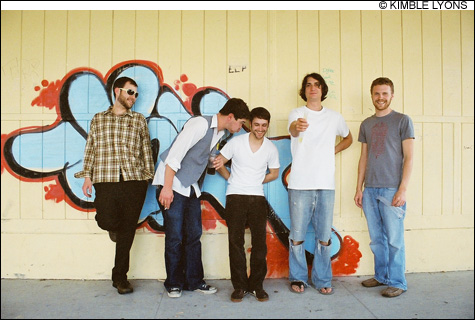
BASKING: Dominic and the Lucid. |
It’s hardly rare for bands to borrow local talents to add flair here and there to a record, but Dominic and the Lucid — essentially a four- or five-piece band — have gone above and beyond the usual guest spots. Fifteen musicians play on Season of the Sun, their 11-song follow-up to 2006’s break-through release, Waging the Wage, and backing vocals are provided by an 18-strong chorus that recorded with engineer Jack Murray in USM’s Corthell Concert Hall.
That kind of talent convergence can be hard to harness, but the new disc sounds cohesive and manages to be dense and interesting without making the listener feel claustrophobic. As he did with Wage, frontman and songwriter Dominic Lavoie shows a great feel for pacing the record, mixing in love-song pop, bouncy rock, and languid string-filled ballads to create a throwback album that’s not quite a “concept,” but certainly demands that you listen to it from front to back.
There are times, though, when I wonder whether Lavoie didn’t gorge himself at the musician-and-talent trough, adding in backing vocals (the screamed piece mixed to the back of “Simpleton’s Hymn” at the finish) or percussion (the recurring ratchet in “Cement”) because he could and not necessarily because the song demanded it. Some of the bouncy pop numbers, like “Come Out and Play,” come off a tad manic.
That said, Lavoie also makes some inspired decisions with the guest players, as with the pairing of pedal steel player Cartwright Thompson and Kallie Ciechomski's viola on “Covered in Colors,” producing a sublime and liquid dream-state behind vocals that positively glow. Long-time drummer Chuck Gagne is great here, too, completely restrained and using his cymbals especially well to punctuate each note of the melody.
In a way, Lavoie seems to have evolved into Portland’s John Lennon (well, actually, Portland has a John Lennon, a rock guitarist, but I’m talking about the Beatles’ Lennon): a guy who can manage to make peace, love, and harmony seem cool without devolving into sentimentality and cheese. Like Lennon’s “Imagine” or “Give Peace a Chance,” Lavoie is able to create whole songs out of very simple themes and repeated phrases while remaining artful and interesting (U2’s “Peace on Earth” from All That You Can’t Leave Behind comes to mind, too). “Be in Love” is bouncy and upbeat with some great phrasings, centered around the idea that “I’ve been around the world once or twice before/But the answer isn’t found in starting wars/I promise you this/A treaty can’t touch the peace within a kiss.” So where is the answer to be found? “The answer’s in love/Be in love, being loved, be loved, be in love.”
So, it shouldn’t surprise you to hear in “Simpleton’s Hymn” that “all the little boys and girls/Need love, need love, they need love.”
Appropriately, this talk of love makes up the heart of the album, with the first three and last three songs providing the rib cage. Themes from the opening “Dog,” gray skies above a dog chained by the side of the road made musical by Nate Cyr’s thrumming bass beside a swirling organ, are revisited in the penultimate (and longest) “Swiveling Moon, All Temptations, All without Fearing,” with “Oh, God, chained dog/You’re life’s the same as mine” made slightly Zappa. In the ninth tune, “Song for Us to Sing,” we hear echoes of the third, “Cease to Exist,” when Lavoie revisits the “Cease” bridge: “I mean every word that I say/When tomorrow comes, better to fade away.”
Finally, there is “Of the Sun,” where piano and strings leave us uplifted, Lavoie’s voice (stronger on every recording) cracks just enough to emphasize his vulnerability, and it’s more than clear that “I’m in a dream/Where everything shines.” It’s a fitting finish to what ultimately feels like a psychedelic return to the Summer of Love, an aesthetic that easy to embrace, all the more so because as popular as “Imagine” might be as a song to sing on American Idol, it doesn’t seem enough people have really gotten the message yet.
Sam Pfeifle can be reached at sam_pfeifle@yahoo.com.